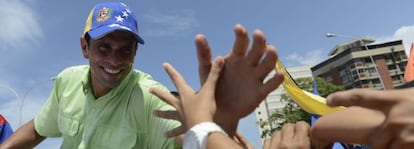“The army will recognize the race results”
Venezuelan opposition contender Capriles believes he will defeat Chávez

In two months, opposition candidate Henrique Capriles has visited towns across Venezuela where people have not seen a presidential contender since Carlos Andrés Pérez was running for office for the first time in 1974. Since he was elected on February 12 to become the united opposition candidate representing the so-called United Democratic coalition (MUD), Capriles, who has served as legislator, mayor and governor, has traveled across Venezuela, going house-to-house asking Venezuelans to give him their vote.
Question. Where do you stand ideologically?
Answer. The debate between left and right is not a debate for the modern world. But if you want to use that traditional concept, you can place me in the heart of Venezuela, looking toward the left. I feel very comfortable being called a liberal because that means having an open vision in economic terms, but at the same time always remembering that the economy is at the service of the people. Venezuela has never been governed by the right, and I have transmitted that message whenever I've been in Europe. Chávez has always talked about the ultra-right by maintaining that he is a leftist. But what left are we talking about? Chávez and his economic model are filled with contradictions and actions that are absolutely fascist in nature, such as making it mandatory for people to register with his party in order to access social services.
Q. The bolivar is overvalued and the Venezuelan economy is based on subsidies and imports. Are you planning reforms, as the government has been claiming?
This government has destroyed jobs, with production falling in all sectors
A. My economic plan involves attracting foreign investment. Today, no one comes to Venezuela to invest, and those that do invest, do so in the oil industry or on speculation because there is no legal security for them. The expropriations have been the worst signal for the economy. I want to increase oil output but also to open the economy in other areas such as tourism, gold, gas, coal, iron and bauxite. Instead of just adjusting the exchange rate, we need to change the economic model - changing it from an import economy to one that produces. Today, Venezuela imports 70 percent of its food. To the skeptics I say that by just changing government the economy will take a turn in the right direction.
Q. You have spoken about keeping Chávez's "missions," the social programs that he began. Are you recognizing that some have been effective?
A. I have never overlooked the fact that this government has made social welfare its number-one priority. But that is not enough. A citizen can obtain a monthly check from the government but that won't help him progress. Only jobs allow a person and families to progress. This government has destroyed jobs, with production falling in all sectors. I believe in strong social programs for people who need them but without having to become victims of political blackmail, which is usually the case, to get a job in this country.
Q. The defense minister has said that the armed forces won't accept any commander who is not Chávez. What do you expect from the army?
A. I don't pay any attention to what the minister says; he is not the army. The military is committed to Venezuelan democracy, which is in the Constitution, and what the people say on October 7 [election day]. I have spoken to many military officers and I know what is being discussed internally. The army is not going to take the risks of refusing to recognize election results.
Q. Chávez also warns that a civil war will break out if he isn't reelected.
A. Like we Venezuelans say, that is nothing but gab. He says those things to try to intimidate us. Chávez is the chaos in this country. Under his government, murders have multiplied five times. What can be worse for a country than to have 20,000 murders each year?
Violence tops voters' concerns
With two weeks to go before the presidential elections in Venezuela, the polls still are divided over who is going to win: Hugo Chávez, for a third term, or Henrique Capriles Radonski. There is one thing that the polls do agree on: more than 70 percent of all Venezuelans believe that crime is the biggest problem facing the country today.
According to the Venezuelan Observatory for Violence, there were 19,336 murders in 2011 - that's one every hour.
Chávez's government has not released any statistics since 2009, when the Interior Ministry stated that the country's murder rate was 43 for every 100,000 people. The global average is 8.8 persons for every 100,000.
"In Venezuela the criminals are winning 10 to zero," said Police Sargent Terán, who patrols the streets of Caracas' Sucre district on motorcycle. His beat includes the red-brick, high-crime neighborhood of Petare. Terán, like most of the Sucre police force, lives in Petare. A few nights back, he had a bad experience.
"Six guys showed up at my door with weapons. I told them, 'Hey, it's me,' as they hadn't recognized who I was," he said.
They were gang members from the neighborhood. "This happens to all of us every day. We have no choice but to coexist with these thugs. One just turns a blind eye to their operations because if you denounce them, they will come and kill your family," he said.
Sucre Police Commissioner José Salcedo takes precautions such as not assigning officers to the neighborhood in which they live, and insisting on patrols of more than four officers.
"I tell my officers that when they go to their homes at the end of the day they should not show up wearing their uniforms. If they see you are alone and a policeman, they will try to take your weapons," Salcedo said.
National statistics show that two out of every 10 crimes are actually investigated and brought to trial. For their work, police officers receive two monthly minimum salaries. According to Chávez, Venezuela has the highest minimum wage in all of Latin America, the equivalent of about 318 euros.
But the bodies are still piling up. Last Friday, the bodies of four victims were brought to the city's Bello Monte morgue. On Saturday, another 11 arrived. One of those victims was Jhanison Eduardo Peña, 24, who lived in the same neighborhood as Sargent Terán. He was the eldest of four brothers and worked at a supermarket. He was standing near his home with some friends when an assailant shot him in the head and chest in an attempt to steal his shoes, shirt and the 200 bolivars (about $15) in his wallet.
Tu suscripción se está usando en otro dispositivo
¿Quieres añadir otro usuario a tu suscripción?
Si continúas leyendo en este dispositivo, no se podrá leer en el otro.
FlechaTu suscripción se está usando en otro dispositivo y solo puedes acceder a EL PAÍS desde un dispositivo a la vez.
Si quieres compartir tu cuenta, cambia tu suscripción a la modalidad Premium, así podrás añadir otro usuario. Cada uno accederá con su propia cuenta de email, lo que os permitirá personalizar vuestra experiencia en EL PAÍS.
¿Tienes una suscripción de empresa? Accede aquí para contratar más cuentas.
En el caso de no saber quién está usando tu cuenta, te recomendamos cambiar tu contraseña aquí.
Si decides continuar compartiendo tu cuenta, este mensaje se mostrará en tu dispositivo y en el de la otra persona que está usando tu cuenta de forma indefinida, afectando a tu experiencia de lectura. Puedes consultar aquí los términos y condiciones de la suscripción digital.









































